Technology innovations in urban development worldwide are helping cities cope with the gap between infrastructure services and population but they are still struggling to ensure resiliency or sustainability. Urban development systems need to adopt a holistic approach for seamless integration between technology innovations, city design, environmental planning and management which are vital to the city’s development.
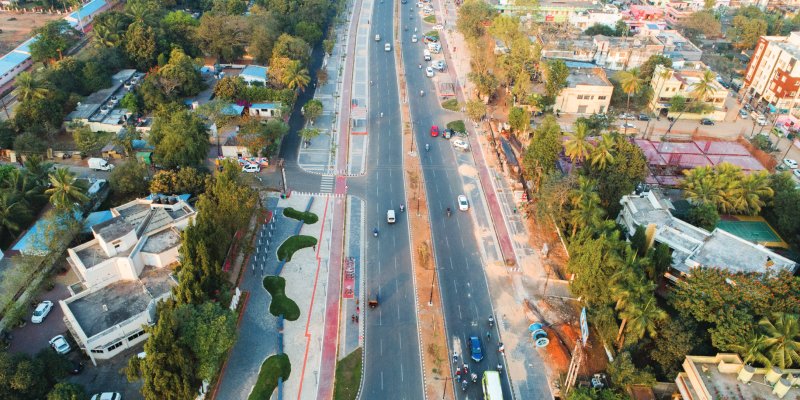
IBI Group is a technology-driven design firm with global architecture, engineering, planning and technology expertise. The company work across disciplines to define the cities of tomorrow through intelligent systems, sustainable buildings, and efficient infrastructure, shaping the way people live, move, learn and heal.
IBI Group joined Arcadis, a global leader in the delivery of sustainable design, engineering, and consultancy solutions for natural and built assets. Together, the combined strength of Arcadis IBI Group provides unprecedented opportunities to offer new client solutions, while defining the cities of tomorrow. The group’s digitally-driven expertise will transform its industries and provide the clients with innovative, future-focused technology-enabled solutions alongside human-centric design excellence.
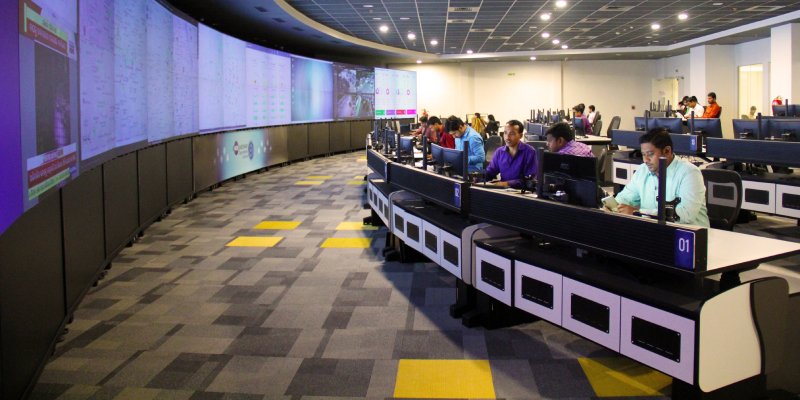
Bhubaneswar Operations Centre; Source: Bhubaneswar Smart City Limited
Expertise
Arcadis-IBI’s interconnected service offerings include system integration, traffic engineering services, technology services as well as placemaking- planning and urban design which allow them to design, build, operate, and maintain modern cities & systems from the ground up.
Below are examples of why technology, design and management go hand-in-hand to ensure holistic solutions for a city.
Institutional Strengthening – Developing an award-winning Smart City Strategy for Bhubaneswar
The Ministry of Urban Development put forth a Smart City Challenge to develop a conceptual plan to improve cities and resident’s lives with smart solutions. Arcadis IBI Group supported the development of a Smart City Challenge proposal for the city of Bhubaneswar, leveraging its global experience in the fields of transportation, planning, design, technology, and intelligence. Working with the Bhubaneswar Municipal Corporation (BMC) and State of Odisha, Arcadis IBI Group prepared its Smart City Plan which was adjudged the first rank out of 98 cities in the country. The proposal emphasized on comprehensive development of the city, taking into consideration mobility, active transportation, energy, water, waste disposal, and integrated infrastructure.
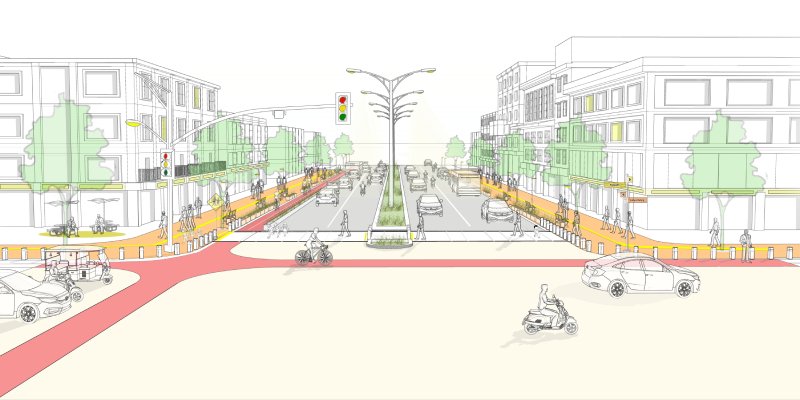
Bhubaneswar Child Friendly Public Space Design Guidelines; Source: Bhubaneswar Urban Knowledge Centre, BDA
Establishing Bhubaneswar Urban Knowledge Centre (BUKC) and Intelligent City Operations and Management Centre (ICOMC).
Arcadis IBI Group established the Program Management unit with more than 20 staff, including sector experts, in the Bhubaneswar Development Authority (BDA). The Bhubaneswar Urban Knowledge Centre (BUKC assisted the BDA in bringing its Smart City strategies together), it provides professional resources and service to create an in-house Knowledge Resource Centre with a physical presence in the BDA, and support the delivery of cutting-edge expertise in five key domains:
- Child-friendly Smart City Centre
- Transportation Planning
- Urban Design & Placemaking
- Smart Cities and Systems Integration
- Communications, Capacity Building & Knowledge Management
Additionally, an Intelligent City Operations and Management Centre (ICOMC) was established to oversee multiple city sub-systems including Traffic Management, Parking, Bus/Transit Operations, Common Fare Card, Smart Utilities, Emergency Response and City Incident Management. Furthermore, a number of citizen engagement initiatives such as city portals, open data, telecommunications and city WIFI zones were introduced to help residents and businesses collaborate within the community.
The arrangement of a Data Management Centre as well as an Urban Knowledge Centre working simultaneously to address urban solutions in Bhubaneswar proved to be a game changer. The data gathered from ICOMC with the help of technology helped BUKC determine plan and design solutions specific to the needs of the city and the people and build capacity within the agencies. Once implemented, ICOMC and BUKC together opened up channel for feedback, communication and monitoring of data for further improvements and upgradation.
Policy level Interventions – Introducing Bhubaneswar with Child Friendly Public Space Design Guidelines and Street Design Guidelines
The establishment of Bhubaneswar Urban Knowledge Centre and Intelligent City Operations and Management Centre led to inflow of city level data such as Traffic volume count, Pedestrian and Cyclist Volume Count, Accident data, Footfall data in Public spaces etc. which led to the realization that the city needs statutory level guidance across local agencies to ensure
- A more permanent solution to traffic issues and congestion.
- A streamlined mechanism for uniform development and management of streets and transit hubs.
- A more comprehensive approach towards traffic management than implementation of projects in silos
Bhubaneswar child friendly public space design guidelines and Bhubaneswar street design guidelines were created to ensure the above citywide. The child friendly guidelines aims at establishing that streets and other public spaces should be designed keeping in mind a child and its caregiver. It acts as an annexure to the larger street design guidelines which is a ready to use technical design guide to implement streetscape projects more efficiently and in accordance with the Smart city interventions and technological improvements. Both guidelines are intended to implement the complete streets policy in the city and to guide city agencies, developers and other stakeholders involved in urban reformations to take a more informed and sensitive approach towards the same.
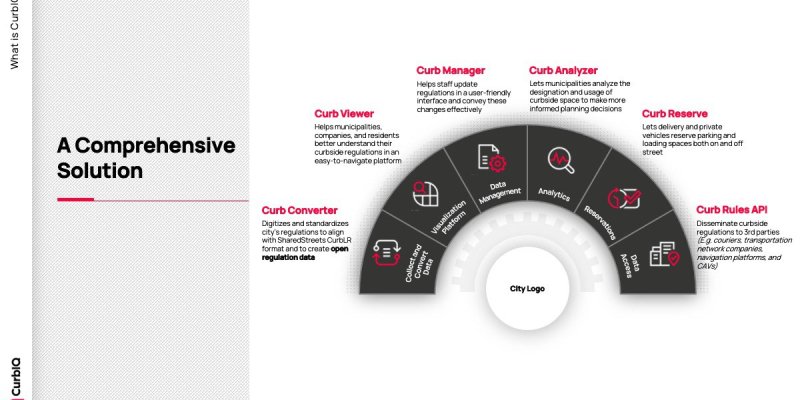
Digitizing Curbside regulations, CurbIQ™ helps cities better understand how their curbs are working today and gives them modern tools to improve operations in the future. Source: Arcadis IBI Group
Spatial Design Interventions – Streetscape design to accommodate increasing traffic and promote Non-Motorized Transit in the city
Spatial Design Interventions in accordance with policies and guidelines add yet another layer to a more sustainable and resilient streets in the city. Contrary to the popular notion that increase in carriageway of a road decreases the traffic congestion, our street design approach focuses on a more integrated approach which takes into consideration environment, importance of public transport and social character. We believe that the root cause of traffic congestion is increase in the use of private vehicles which is related to the economic and demographic trends of the city and is an ever-increasing curve. Thus, the design focuses on addressing the solution for the root cause rather than the issue in hand.
As an empaneled Urban Design firm with the Pune Municipal Corporation and as a consultant to Bhubaneswar Smart City Limited, Arcadis IBI Group has undertaken a series of streetscape improvement projects by prioritizing non-motorized transport (NMT), and public transport and incorporating smart solutions such as rain water harvesting, solar based lighting etc. The interventions catalyze further development in the area as well as serve as a model street designs for replication in other areas across the city.
Leveraging Design with Technology– Adaptive Traffic Control Systems
Traffic woes and congestion are listed as one of top most challenges in any urban city. Streamlining and management of traffic systems thus has become a priority for cities across the world. With increase in the dependency of the use of private vehicles, the road design and infrastructure implemented a few years ago cannot accommodate the increasing vehicular movement which leads to congestion and pollution. Like many cities worldwide, Indian cities, too, are now investing in dynamic technology such as Adaptive Traffic Control Systems which is a traffic management strategy in which traffic signal timing changes, or adapts, based on actual traffic demand. This is accomplished using an adaptive traffic control system consisting of both hardware and software.
With expertise in both urban planning as well as traffic engineering and technology, Arcadis IBI worked to develop the system, in various cities such as Chennai, Hyderabad and Bhubaneswar, designed keeping in mind factors such as existing street widths, proposed masterplans, traffic volume count, pedestrian volume count etc. Unlike existing traffic signals, the new adaptive traffic signal control system being implemented in greater Hyderabad automatically and continuously adjust the green times based on the changing arrival patterns of vehicles at an intersection, with the objective of optimizing a combination of delay and number of stops.
Using camera-based detectors, each junction movement constantly monitors the approaching vehicles and creates new timing sequences to match them. A central system is developed which provides monitoring of data from each junction and further optimizes the system at a network level to ensure synchronization of signals to reduce system delays.
Further the data from the system is analyzed and circulated to different agencies to improve and upgrade street network plans and design for the city.
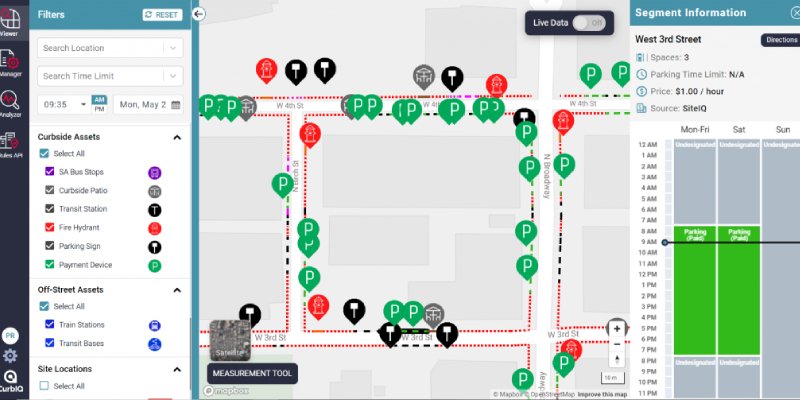
Figure 4: Interactive tool to assess Curbside management; Source: Arcadis IBI Group
Software innovations – a boon for integration of transportation systems
Bridging the gap between technology and design requires a platform which streamlines the data and provides the stakeholder with the information they seek in real time. This information can range from accessing parking facilities to getting real time traffic information and so on. To reduce the gap Arcadis IBI developed a range of products to make life easier for stakeholders seeking specific information.
CurbIQ – Curbside Management
The curbside is one of the most poorly understood parts of the municipal right-of-way. On the one hand, it’s a huge piece of municipal infrastructure that is essential to the urban transportation landscape, supporting billion-dollar industries like goods movement and ride sharing. On the other, it is a scarce – and diminishing – resource whose management principles remain rooted in 20th century technologies.
In a time where curbside uses are growing to include expanded patios, dedicated courier loading zones, and other temporary uses, cities need to leverage innovations in collecting, managing, and sharing curb data to improve the efficiency of operations at the curbside.
In the summer of 2020, The City of Toronto implemented CaféTO, its pandemic response program designed to help the restaurant industry expand its outdoor dining capacity through patios. The city retained IBI Group for this initiative which supported 800 restaurants. The team needed to help answer questions such as: how many on-street parking spaces are being repurposed for patios? What other curbside regulations are in place at this location? Are the patios too close to fire hydrants or transit stops? Is the adjacent speed limit acceptable? However, due to stay-at-home orders, the team had challenges conducting typical site visits to confirm existing conditions. Current online mapping services that provide panoramic street views lacked consistent, clear images of traffic signs and didn’t capture information such as speed limits, parking bylaws, and loading zones.
The IBI team needed a single reliable source of curbside regulation and asset information.
Enter CurbIQ.
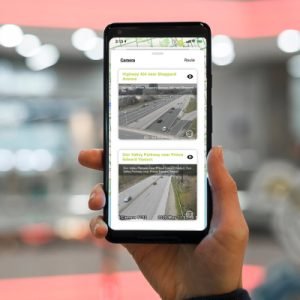
An internationally-proven, white-label advanced traveller information system (ATIS) that provides real-time, multimodal trip planning to the public; Source: Arcadis IBI Group
Made by the parking and curbside management experts at Arcadis IBI Group, CurbIQ is a curbside management software solution that digitizes curbside regulations and transportation assets, and displays them on a web-based map, for instant access. These regulations and assets can be managed and analyzed, to quickly surface insights such as the number of on-street parking spaces on a given street or the specific parking restriction in place at 5:00 pm on a Friday.
Using an interactive map, the team identified parking and loading restrictions, speed limits, fire hydrants, and more in real-time. A built-in measurement tool helped verify that the patios would be an appropriate distance from intersections, transit stops, and fire hydrants according to city criteria. This information was then cross-referenced on detailed design drawings — providing the team with a desktop tool to complete these essential tasks. Lastly, they could calculate the number of on-street parking spaces converting to patios using CurbIQ, minimizing field visits and guesswork, providing a quick and accurate solution.
TravelIQ – A powerful traveller information and event management tool
Traffic incidents can cause massive disruptions. Unsafe highway conditions can be treacherous. Road closures can cause unnecessary gridlock. In many daily situations, accurate, timely information is important.
TravelIQ keeps users informed with an internationally-proven, advanced traveller information system on a secure cloud-based platform with multi-channel flexibility. For transportation authorities, Travel-IQ helps to improve public safety by encouraging travellers to avoid problem areas and informing necessary road repairs. For private-sector clients, the software can provide location-based services and targeted marketing and advertising opportunities.